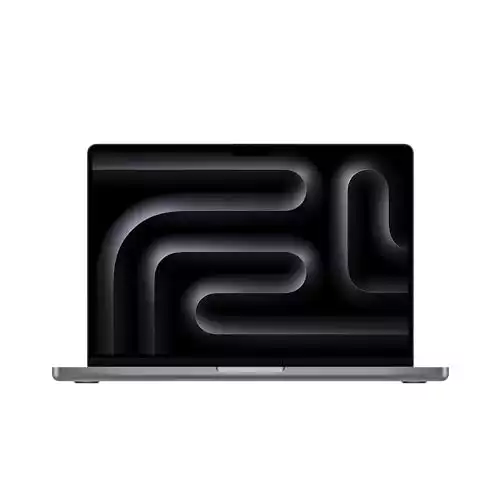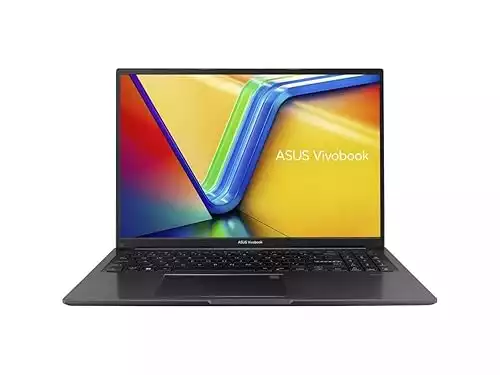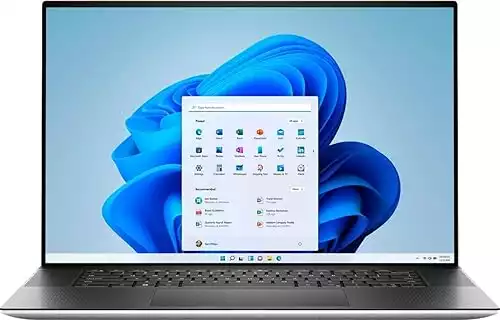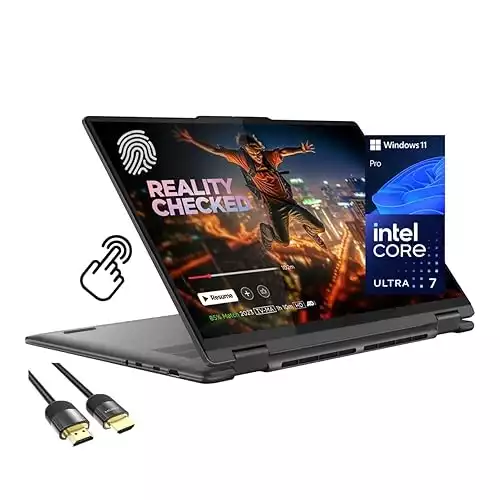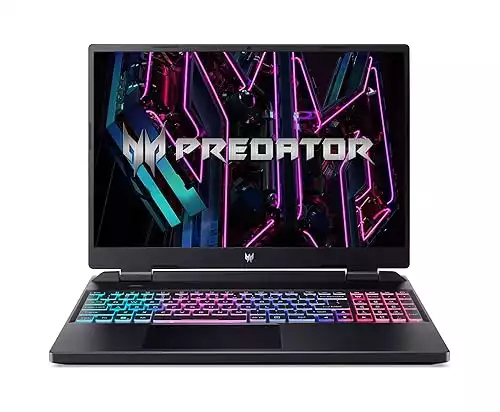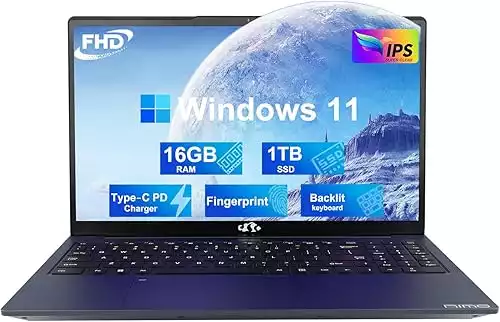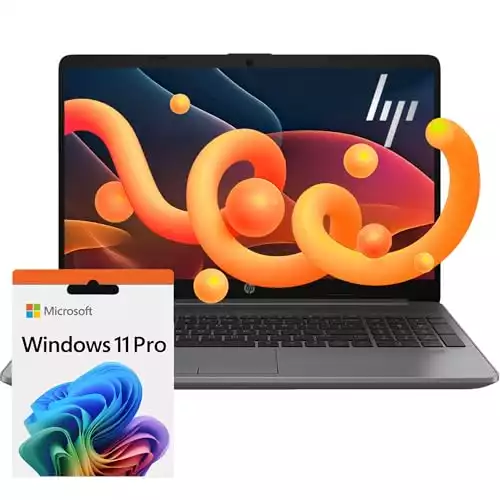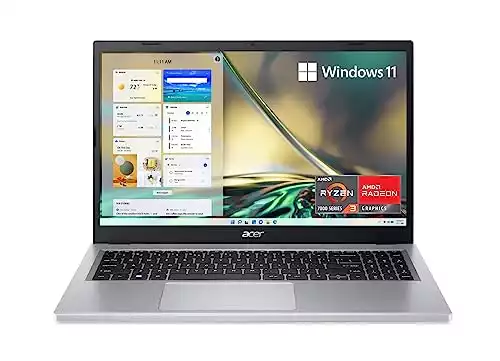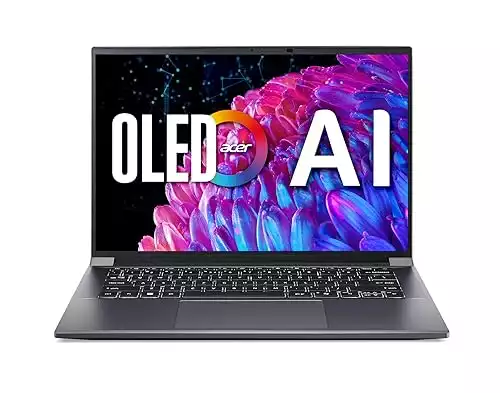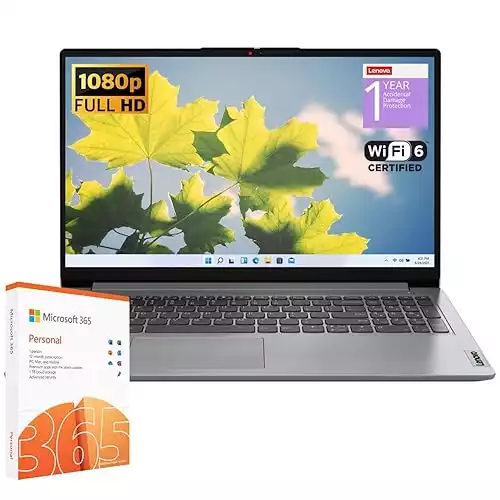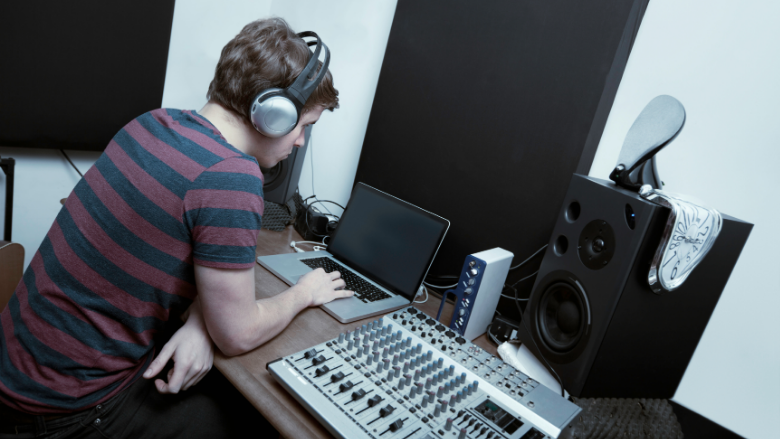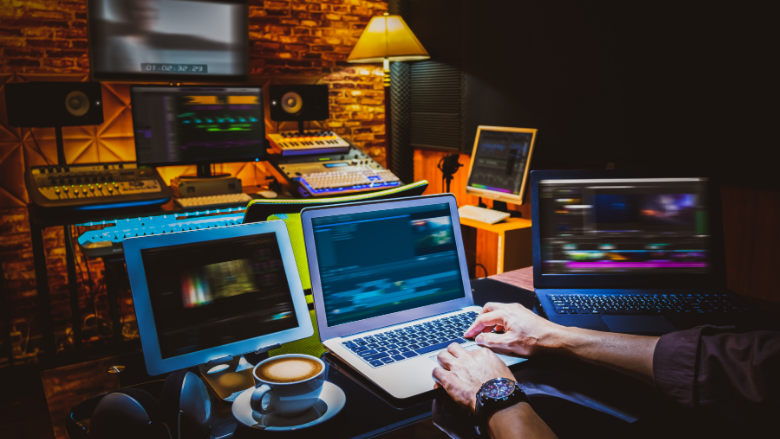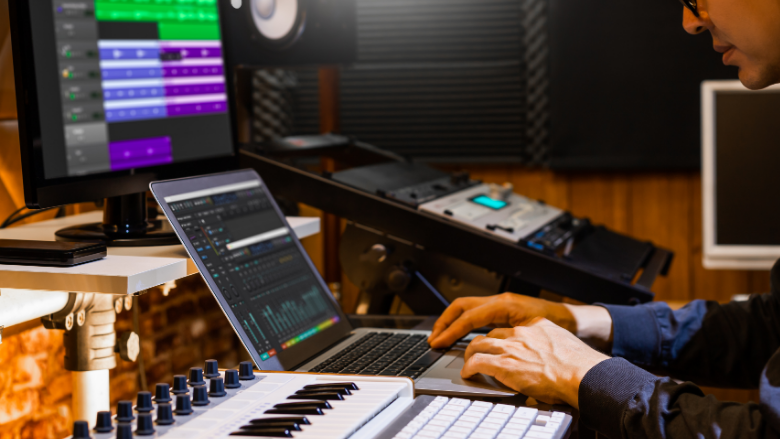Creating music requires powerful hardware that can handle the intensive tasks of audio recording, mixing, and editing. Whether you are a professional music producer or an enthusiast looking to improve your craft, you need to know the best laptops for music production.
Using just a PC or a laptop for music production can be highly effective and convenient, thanks to pre-installed audio editing software packages, additional applications, and built-in features that enhance the music production process.
Selecting the perfect laptop for music production involves considering processing power, battery life, and audio interface compatibility.
Factors like storage, RAM, and display quality also play a significant role in making a choice that will enhance your workflow and record music on. With the right setup, producing music becomes more efficient and enjoyable.
This guide will help you find the best laptops for music production, highlighting features like sound quality, performance, and portability.
Key Learnings
- Best laptops for music production: Find the right fit for your music studio needs.
- What to look for in a music production laptop: From CPU power to battery life, we’ve got you covered.
- Top 10 recommendations: We’ll showcase the best options for beginners and pros alike.
|
Pro-Level Music Mastery |
Effortless Sound Production |
Ultimate Studio Performance |
The 10 Best Laptops for Music Production
- Apple 2023 MacBook Pro
- ASUS VivoBook 16
- Dell XPS 17 9730
- Lenovo Yoga 7i
- Acer Predator Helios Neo 16
- NIMO 15.6 FHD
- HP 255 G10
- Acer Aspire 3 A315-24P-R7VH
- Acer Swift X 14 SFX14-72G-77DZ
- Lenovo IdeaPad 1 15IJL7
1. Apple 2023 MacBook Pro
The Apple 2023 MacBook Pro comes equipped with the powerful M3 chip, 8-core CPU, and 10-core GPU, making it a beast for music production. With up to 22 hours of battery life, it's ideal for long recording sessions.
- M3 Chip – Exceptional processing power for audio tasks.
- Liquid Retina XDR Display – Vibrant colors for music and video editing.
- Seamless Integration with Apple Products – Ideal for Mac-based studios.
Why Someone Should Buy:
The Apple MacBook Pro is an industry-standard for many music producers, thanks to its incredible performance, portability, and reliability. It's perfect for those using software like Logic Pro or GarageBand.
Technical Features:
- CPU: M3 chip (8-core CPU, 10-core GPU)
- RAM: 8GB, expandable
- Storage: 512GB SSD
- Display: 14.2-inch Liquid Retina XDR
Review:
The 2023 MacBook Pro offers seamless performance, especially when running intensive DAWs like Logic Pro and Ableton Live. It excels in handling multiple audio tracks, plugins, and virtual instruments without stuttering.
Verdict:
This MacBook is a top choice for professional music production, offering superior performance and long battery life.
This Product is Perfect For:
- Producers working with Apple software.
- Creatives needing long battery life.
- Users seeking high processing power.
2. ASUS VivoBook 16
The ASUS VivoBook 16 is a solid choice for music producers who need reliable performance at an affordable price. Equipped with an AMD Ryzen 5 processor, it handles most DAWs with ease.
- AMD Ryzen 5 Processor – Smooth multitasking for music production.
- 16-inch Display – Ample screen size for editing tracks.
- Durable Build – Military-grade durability for longevity.
Why Someone Should Buy:
It’s a great budget-friendly laptop that doesn’t sacrifice performance. With fast charging and excellent display quality, it's perfect for both beginners and seasoned pros looking for value.
Technical Features:
- CPU: AMD Ryzen 5
- RAM: 8GB
- Storage: 512GB SSD
- Display: 16-inch FHD
Review:
The VivoBook 16 stands out with its quick charging, expansive display, and robust performance. It’s a great all-rounder for music production on a budget, handling basic to intermediate projects smoothly.
Verdict:
This is one of the best affordable options for music production, delivering solid performance for its price range.
This Product is Perfect For:
- Beginner music producers.
- Budget-conscious buyers.
- Artists needing a large screen for editing.
3. Dell XPS 17 9730
The Dell XPS 17 is a powerhouse with a 17-inch 4K touchscreen and an Intel i9 processor. It’s designed for high-end music production and multitasking, ideal for handling large sessions and complex audio projects.
- 4K Display – Stunning resolution for detailed music editing.
- Intel i9 Processor – Excellent for running multiple DAWs simultaneously.
- 64GB RAM – Handles the heaviest sound production tasks effortlessly.
Why Someone Should Buy:
The Dell XPS 17 is perfect for those who need high performance without compromise. Its huge RAM capacity and 4K display make it a dream machine for professional producers.
Technical Features:
- CPU: Intel i9-13900H
- RAM: 64GB
- Storage: 2TB SSD
- Display: 17-inch 4K UHD+
Review:
This laptop handles demanding music production tasks like a breeze, offering unmatched power and storage. Its large, vibrant display is perfect for precise audio editing.
Verdict:
If you need a laptop that can handle intense audio creation projects, the Dell XPS 17 is a top-tier choice.
This Product is Perfect For:
- Professional music producers.
- Audio engineers working with large sessions.
- Creatives needing a powerful, portable workstation.
4. Lenovo Yoga 7i
The Lenovo Yoga 7i features a versatile flip-and-fold design, making it great for portability and versatility. Its Intel processor and 360-degree hinge are perfect for producers who want flexibility on the go.
- 360-Degree Flip Design – Use it as a laptop or tablet.
- Intel Processor – Fast and efficient for most DAWs.
- Wi-Fi 6E – Fast and reliable connectivity for remote music collaboration.
Why Someone Should Buy:
Its flexibility makes it ideal for artists who work both in home studios and on the go. The Yoga 7i offers the performance needed for music production with added versatility.
Technical Features:
- CPU: Intel 12-core processor
- RAM: 16GB
- Storage: 1TB SSD
- Display: 14-inch FHD
Review:
This laptop excels in both performance and portability. It’s a great laptop for multitasking, making it perfect for producers who need to move between work environments.
Verdict:
The Yoga 7i is the perfect combination of power and flexibility, ideal for producers who value mobility.
This Product is Perfect For:
- On-the-go music producers.
- Creators needing a convertible design.
- Multitasking musicians.
5. Acer Predator Helios Neo 16
The Acer Predator Helios Neo 16 is a gaming laptop that doubles as a powerhouse for music production. With an Intel i7 processor and NVIDIA graphics, it excels in handling resource-intensive DAWs.
- Intel i7 Processor – High performance for audio and video production.
- NVIDIA RTX 4060 – Ensures smooth rendering of visual and audio projects.
- RGB Backlit Keyboard – Great for late-night editing sessions.
Why Someone Should Buy:
It’s a fantastic choice for music producers who also enjoy gaming or need a more compact laptop, that can handle high-demand tasks. With excellent cooling technology, it won’t overheat during long sessions.
Technical Features:
- CPU: Intel i7-13650HX
- RAM: 16GB
- Storage: 512GB SSD
- Display: 16-inch WUXGA
Review:
This gaming laptop shines in music production, offering enough power to run demanding DAWs, virtual instruments, and plugins without hiccups.
Verdict:
A perfect option for music producers who also enjoy gaming or need just a laptop that that can handle demanding tasks.
This Product is Perfect For:
- Music producers who are also gamers.
- Creatives needing strong performance and graphics.
- Users working with visual and audio projects.
6. NIMO 15.6 FHD
The NIMO 15.6 FHD is a budget-friendly option with surprising power. Its 16GB RAM and 1TB SSD make it a solid choice for beginner to intermediate music creators.
- 16GB RAM – Great for multitasking and running several DAWs.
- 1TB SSD – Offers plenty of storage for large audio files.
- Fingerprint Sensor – Ensures security and easy login.
Why Someone Should Buy:
For its price, the NIMO 15.6 FHD offers excellent performance, making it an ideal choice for music creators who want a powerful machine without breaking the bank.
Technical Features:
- CPU: Intel Pentium
- RAM: 16GB
- Storage: 1TB SSD
- Display: 15.6-inch FHD
Review:
This laptop delivers solid performance for its price point, handling basic music production tasks efficiently. It's an excellent option for budget-conscious producers who still need ample storage and RAM.
Verdict:
The NIMO 15.6 FHD is an affordable, capable option for music production, offering good performance at a budget-friendly price.
This Product is Perfect For:
- Beginner music creators.
- Budget-conscious buyers.
- Artists looking for a solid, affordable laptop.
7. HP 255 G10
The HP 255 G10 is an excellent option for those who need a balance between performance and portability. It features a Ryzen 3 processor and a 15.6-inch display, making it ideal for music production on the go.
- Ryzen 3 Processor – Offers great performance for the price.
- 1TB SSD – Plenty of storage for all your music files.
- Lightweight Design – Easy to take with you wherever you go.
Why Someone Should Buy:
This laptop is perfect for traveling musicians who need something portable yet powerful enough to handle music production tasks.
Technical Features:
- CPU: AMD Ryzen 3
- RAM: 16GB
- Storage: 1TB SSD
- Display: 15.6-inch FHD
Review:
The HP 255 G10 offers solid performance, lightweight portability, and excellent storage space, making it an ideal companion for musicians who need to produce on the go.
Verdict:
A well-rounded laptop perfect for producers who need portability without sacrificing the best performance ever.
This Product is Perfect For:
- Traveling music creators.
- Users who need a lightweight but powerful laptop.
- Artists working with large music files.
8. Acer Aspire 3 A315-24P-R7VH
The Acer Aspire 3 is a budget-friendly laptop that offers the basics you need for music production. It’s perfect for beginners who are just starting out and don’t need all the high-end features of more expensive models.
- AMD Ryzen 3 Processor – Provides enough power for basic DAW tasks.
- FHD Display – Clear visuals for audio editing.
- Affordable – Great value for the price.
Why Someone Should Buy:
This laptop is perfect for those who need a simple, affordable machine that can handle video calls and music production without all the frills.
Technical Features:
- CPU: AMD Ryzen 3
- RAM: 8GB
- Storage: 128GB SSD
- Display: 15.6-inch FHD
Review:
The Acer Aspire 3 offers just enough power for beginner music production and more intensive tasks like editing audio and working with simple DAWs. It’s a solid entry-level choice at a low price.
Verdict:
Great for beginners looking to produce music on a more budget laptop, this budget laptop also covers the basics without overwhelming the wallet.
This Product is Perfect For:
- Beginner producers.
- Students and hobbyists.
- Budget-conscious buyers.
9. Acer Swift X 14 SFX14-72G-77DZ
The Acer Swift X 14 is a sleek, lightweight laptop with powerful specs, perfect for producers who need a portable, high-performing machine. With an Intel Core i7 and NVIDIA RTX 4050, it's ideal for audio and video editing.
- Intel Core i7 Processor – Strong enough for heavy audio creation tasks.
- NVIDIA GeForce RTX 4050 – Excellent for handling visual plugins and audio-visual projects.
- Thin and Lightweight – Perfect for producers on the move.
Why Someone Should Buy:
This is a fantastic choice for music creators who also work with video or graphics, offering top-tier performance in a sleek package.
Technical Features:
- CPU: Intel Core i7
- RAM: 16GB
- Storage: 512GB SSD
- Display: 14.5-inch OLED
Review:
The Acer Swift X 14 excels in sound production tasks while also being great for video and graphic work. Its lightweight design makes it easy to carry around, ideal for traveling creators.
Verdict:
One of the best choices for music creators who need a powerful, portable workstation.
This Product is Perfect For:
- Music producers who work with audio and visual projects.
- Users who need a lightweight, powerful machine.
- Artists looking for a high-end portable laptop.
10. Lenovo IdeaPad 1 15IJL7
The Lenovo IdeaPad 1 is a budget-friendly laptop with a solid processor and plenty of storage for all your music files. It’s perfect for beginner producers who want to learn the basics of music production.
- Intel Celeron Processor – Handles basic music production tasks.
- 1TB SSD – Ample storage for music files.
- FHD Display – Crisp visuals for audio editing.
Why Someone Should Buy:
The Lenovo IdeaPad 1 offers great value for money, making it perfect for beginners just starting with music production.
Technical Features:
- CPU: Intel Celeron
- RAM: 20GB
- Storage: 1TB SSD + 128GB eMMC
- Display: 15.6-inch FHD
Review:
This laptop delivers solid performance for basic music production tasks. It’s perfect for beginners or hobbyists who need a budget-friendly option with plenty of storage.
Verdict:
A great budget-friendly option for beginner sound engineers looking for a reliable laptop.
This Product is Perfect For:
- Beginner sound engineers.
- Students and hobbyists.
- Artists needing extra storage space.
Buyer's Guide for Choosing the Best Music Production Laptop
When it comes to choosing the best laptop for music production, processing capability is crucial. The CPU (Central Processing Unit) is responsible for running your DAWs (Digital Audio Workstations), virtual instruments, and plugins.
The stronger the CPU, the more seamless your music production experience will be. A powerful CPU can handle heavy loads, such as running multiple sound tracks, an audio file managing complex plug-ins, and ensuring your system runs smoothly even under pressure.
Intel Core processors and Apple’s M1 or M2 chips, like those found in the Apple MacBook line, are excellent for music production laptops. If you’re a Windows user, you’ll want to look for an Intel Core i7 or Ryzen 7 processor to ensure smooth performance.
For those who use macOS systems, the Apple MacBook Pro and MacBook Air both offer the processing capability necessary to run demanding software like Logic Pro or Ableton Live.
Mac OS is popular in professional settings for its stability and performance, while many music creators also successfully use Windows alternatives, which can be more budget-friendly and customizable depending on preferences.
Gaming laptops are also a great option, as they typically have turbo boost capabilities, ensuring your audio production runs efficiently.
RAM and Storage
RAM and storage are essential for a smooth music production workflow. Ideally, you need at least 16GB of RAM, especially if you're working with large sample libraries or recording high-quality audio files.
Most laptops for music creation come with the option to upgrade to 32GB or more, which is helpful for more complex sound production setups. If you're using a lot of midi controllers or virtual instruments, having sufficient RAM ensures that everything operates smoothly without crashing or lagging.
As for storage, an SSD (solid-state drive) is the best option. Not only does an SSD ensure faster load times for your software and projects, but it also helps when you're accessing large music files during audio production.
Having enough storage space is also crucial, especially if you save numerous audio files and software packages. Opt for at least 512GB SSD, but if you anticipate needing more storage, go for 1TB or invest in an external drive.
Audio Interface and Ports
To produce music efficiently, the right audio interface and number of USB ports are important. Your laptop should have enough USB-C or USB 3.0 ports to accommodate midi controllers, external hard drives, and an audio interface.
Most sound engineers use audio interfaces to connect instruments and microphones to their music production laptop. Look for a Windows laptop or Apple MacBook with Thunderbolt 3 or 4 support, which provides fast data transfer and reduced latency when recording live instruments.
A reliable audio interface is essential for high-quality recordings, especially if you're working in a home studio setup. Ensure that your laptop also has a headphone jack to monitor your mixes effectively.
If your laptop screen doesn’t offer enough real estate for mixing, consider getting an external monitor or a laptop with a larger screen size.
Battery Life
Battery life is crucial for sound engineers who are constantly on the go. The best laptop could offer around eight hours of battery life allows you to produce music without being tethered to a power outlet. This is especially helpful for mobile setups or working in different environments.
Whether you're working at a café, traveling, or at a gig, you need reliable battery life to ensure uninterrupted creativity. Laptops like the MacBook Air and MacBook Pro are known for their long battery life, making them great for portable music production.
Many Windows laptops also provide excellent battery performance, particularly models designed for gaming or creative work, like the Dell XPS or Microsoft Surface models, which balance processing capability with power efficiency.
Display and Graphics
A high-resolution display is key for precise audio production and editing. Whether you're working with DAWs like Ableton Live or FL Studio, a good laptop screen ensures you can see the fine details of your project. Look for laptops with FHD or 4K displays, such as the Dell XPS or Apple MacBook Pro.
These laptops not only provide crisp visuals for editing audio tracks but also offer enough graphical power to handle any video integration you may need for making music videos or visual elements in your productions.
In addition to resolution, having a laptop with a large screen size is beneficial when editing multiple tracks. More compact laptops, like the Acer Swift X or MacBook Air, can be paired with an external monitor for an even better experience.
Frequently Asked Questions
What should I look for in the best laptop for music production?
Focus on processing capability, at least 16GB of RAM, fast SSD storage, and good connectivity options for external devices. Make sure the laptop has enough ports for midi controllers and audio interfaces.
Can I use a gaming laptop for music production?
Yes, gaming laptops are excellent for music production due to their high-end CPUs and GPUs. They’re built to handle intensive tasks like running DAWs, plugins, and virtual instruments. Laptops like the Acer Predator or Razer Blade can easily double as music production laptops.
Conclusion
Choosing the right laptop, including windows laptops, is essential for music production choosing both beginners and professional sound engineers.
By focusing on factors such as CPU performance, RAM, storage, battery life, and connectivity, you can ensure your best laptop that meets your audio production needs.
Whether you opt for a Windows laptop like the Dell XPS or a macOS machine like the Apple MacBook Pro, the key is to balance performance and portability.

